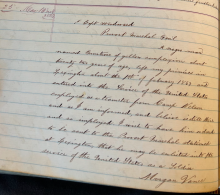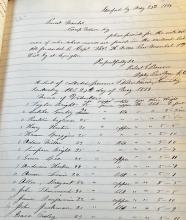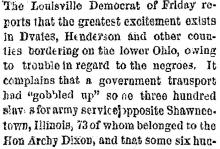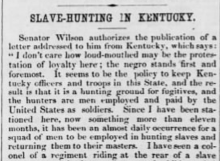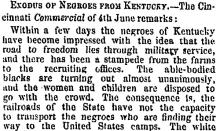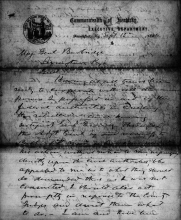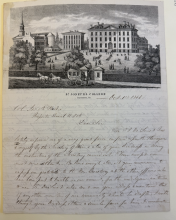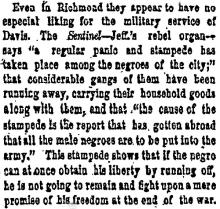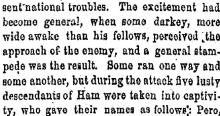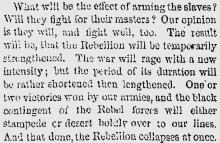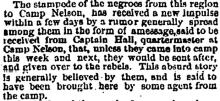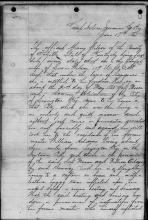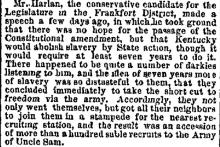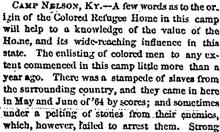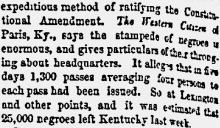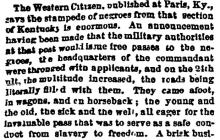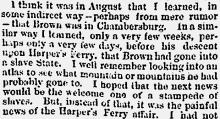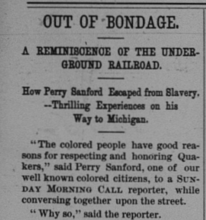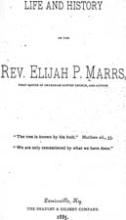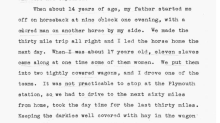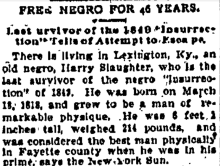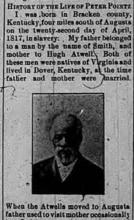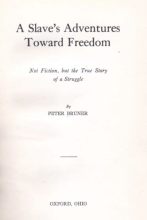View All Documents // 1840s // 1850s // 1860s
Displaying 1101 - 1135 of 1135
Capt Woodward
Provost Marshal Genl
A negro man named Montrose of yellow complexion about twenty two years of age, left my premises in Lexington about the 1st of February 1864 and entered into the Service of the United States employed as a teamster from Camp Nelson and as I am informed, and believe is still there and so imployed [sic]. I wish to have him ordered to be sent to the Provost Marshal stationed at Lexington, that he may be enlisted into the service of the United States as a soldier.
Morgan Vance
Stanford Ky May 27th, 1864
Provost Marshal
Camp Nelson Ky
please provide for the enlisted men of color whose names are found in the enclosed list till forwarded to Capt. Thomas H. Moore Prov Marshal 7th Dist. Ky at Lexington
Respectfully &c,
Robert E Barron
A list of colored persons Volunteered in service of US in Stanford Lincoln County
Name of Volunteers age occupation complexion eyes hair height
1 Taylor Bright 35 farmer copper blk Blk 6ft
SLAVE-HUNTING IN KENTUCKY.
EXODUS OF NEGROES FROM KENTUCKY. – The Cincinnati Commercial of 4th June remarks:
Commonwealth of Kentucky,
EXECUTIVE DEPARTMENT.
Frankfort, Ky., Sept 15th, 1864.
Maj Genl Burbridge
Lexington Ky
Genl.
ST. JOSEPH'S COLLEGE
Bardstown, Ky. ----Oct. 1st 1864
TELEGRAPH TO THE HERALD
FROM THE SOUTH
WITHDRAWAL OF MR. FOOTE FROM THE REBEL CONGRESS.
His Opinion of Jeff. Davis.
THE “CONFEDERACY” TUMBLING TO PIECES.
GEN. LEE REPORTED SEVERELY WOUNDED.
Stampede of Negroes to the Union Lines.
THE SLAVES TO BE ARMED IMMEDIATELY.
Seizure of Every Able Bodied Negro by the Rebel Government.
Great Stampede of Negroes from Richmond.
HOW THEY FIGHT FOR THEIR MASTERS.
[From the Richmond Sentinel, Dec. 23.]
A regular panic and stampede has taken place among the negroes of this city. Between forty and fifty have run off to the Yankees since last Saturday, in most cases carrying their trunks and household goods. On Wednesday night seven negroes belonging to Mr. Valentine Ricklar, living just beyond Union Hill, went off, carrying all their furniture. The cause of the stampede is the report that has gotten abroad that all the male negroes are to be put into the army.
General Lee and the Negro Soldiers Question––The Richmond Negroes Running to Avoid the Draft.
TELEGRAPH TO THE HERALD
THE CONFEDERACY "UNDER A CLOUD."
How Jeff. Davis' Salary was Increased.
The Exchange of Prisoners is to be Resumed at Richmond.
STAMPEDE OF NEGROES TO AVOID CONSCRIPTION.
Richmond Papers Doubt the Capture of Savannah.
NEW YORK, Dec. 27th. The Richmond examiner of Saturday acknowledge that the affairs of the Confederacy are under a real cloud.
Jeff. Davis having asked for an increase for salary, a bill was passed by the rebel Senate to provide for lighting and warming to the executive mansion and for the supply of forage and commissary stores for the commander-in-chief of the army and navy of the so-called Confederate States.
Local Intelligence.
MUNICIPAL COURT.
HIS HONOR, MAYOR COLEMAN, PRESIDING.
MONTGOMERY, ALA., Jan. 5, 1865.
Arming the Slaves.
The Rebel leaders are conscious that in adopting the policy of arming the Slaves, they are embarking in a perilous enterprise. They approach the subject with fear and trembling. They know they are taking a step which m ay result not only in the ruin of their cause but in the destruction of society itself. They are well aware that the arms they propose to put into the hands of the servile masses may be turned against their own breasts, and the power they delegate may be a power that will be used to crush them. They are not without misgivings that the education in arms they intend to confer upon the Blacks will be "improved" not only to achieve their own Freedom, but to expel the white race as well.
How Emancipation Works.
THE SITUATION.
The town of Lynchburg, Virginia, which from the commencement of the war the rebels had been able to maintain possession of, and which only a week ago was considered of sufficient strength to withstand for some time, if Lee could get his army within its works, a siege of the entire Army of the Potomac, surrendered on Tuesday to a lieutenant colonel in command of a Union scouting party, and is now garrisoned by a brigade of national troops.
STAMPEDE OF NEGROES.
DANVILLE, KY., April 22, 1865.
To the Editors of the Louisville Journal:
The stampede of negroes from this region to Camp Nelson, has received a new impulse within a few days by a rumor generally spread among them in the form of a message, said to be received from Captain Hall, quartermaster at Camp Nelson, that, unless they came into camp this week and next, they would be sent after, and given over to the rebels. This absurd story is generally believed by them, and is said to have been brought here by some agent from the camp.
Camp Nelson, Jessamine Co. Ky.
June 17th 1865
How Dinah Got a Companion for Life.
"Mack," writing from Lexington (Ky.) to the Cincinnati Commercial, says:
Mr. Harlan, the conservative candidate for the Legislature in the Frankfort District, made a speech a few days ago, in which he took ground that there was no hope for the passage of the Constitutional amendment, but that Kentucky would abolish slavery by State action, though it would require at least seven years to do it. There happened to be quite a number of darkies listening to him, and the idea of seven years more of slavery was so distasteful to them that they concluded immediately to take the short cut to freedom via the army. Accordingly, they not only want themselves, but got all their neighbors to join them in a stampede for the nearest recruiting station, and the result was an accession of more than a hundred sable recruits to the Army of Uncle Sam.
Shearman House, Chicago, Il., July 6th, 1865.
MY DEAR FRIENDS,
J.H. TUKE, AND F. SEEBOHM,
In my last letter from Cincinnati, I mentioned that whilst at Camp Nelson, Levi Coffin and I had attended a meeting of freedmen. This meeting was, to me at least, a very interesting one; and, though I cannot hope to make my account of it at all worthy of the occasion, I purpose jotting down a few details, seeing that they may convey a fair idea of what such occasions are in general.
Refugees Home in Kentucky.
For the Worcester Daily Spy.
...This is an age of wonders, and not the least among them is the celebration of the Fourth of July at Camp Nelson, Ky., by the colored people. To see so many thousands, who a year ago were slaves, congregate in the heart of a slave State and celebrate the day sacred to the cause of freedom, "with none to molest or make afraid," was a grand spectacle. It was the first time we have ever been permitted to celebrate the Nation's Day. The celebration was under the management of Capt. [T. E.] Hall, and Rev. J. G. Fee. These men deserve much credit for their zeal and untiring activity in the cause of our race. The people gathered in from far and near. With several regiments of colored soldiers, with the thousands at the Refugee Home, and with the many from different parts of the country, the numbers swelled to many thousands. Such an assemblage of colored people on the "sacred soil of Kentucky" was never before beheld.
Kentucky and other papers have lately published what purported to be an order from Gen Palmer, or by his authority, granting passes to all negroes who desired to leave the State— an expeditious method of ratifying the Constitutional Amendment. The Western Citizen of Paris, Ky., says the stampede of negroes is enormous, and gives particulars of their thronging about headquarters. It alleges that in five days 1,300 passes averaging four persons to each pass had been issued. So at Lexington and other points, and it was estimated that 25,000 negroes left Kentucky last week.
But now comes The Cincinnati Enquire of August 1, with this statement
STAMPEDE OF NEGROES IN KENTUCKY.
General Palmer to the President.
HEADQUARTERS, DEPARTMENT OF KENTUCKY, }
LOUISVILLE, Ky., July 27, 1865 }
To his Excellency ANDREW JOHNSON, President of the United States:––
Slavery in Kentucky.
General John M. Palmer, commanding the Department of Kentucky, has addressed the following letter to President Johnson in answer to the charge that the provost-marshals of his department were in the habit of issuing "free papers" to colored persons, without regard to the legal right of those receiving them to freedom––
"HEADQUARTERS, DEPARTMENT OF KENTUCKY, }
LOUISVILLE, Ky., July 27, 1865 }
To his Excellency ANDREW JOHNSON, President of the United States:––
. . . I was born in Nelson County, Kentucky, and lived there until I was eighteen years of age, at which time I went to Louisville, and was in that city when the late horrid rebellion broke out. I enlisted in the 12th U.S. Colored Heavy Artillery in the Fall of 1864, and my only sorrow is that I did not enlist sooner. I left a home such as would have made a slave happy, as long as there was a grain of happiness to be found in slavery. While living in Nelson county I indeed thought that it was right that all colored people should be slaves, and I was far from being the only one having the same opinion; but oh, how different now! There were five or six colored people in the county who could read, and they were disliked very much by the white people on that account; so you see, although we were capable of being taught, the fear of our masters and mistresses kept us bound in the frontiers of ignorance.
COMMUNICATIONS.
Recollections of the Underground Railroad.
NUMBER TWO.
We had also agencies and stations at Baltimore–Jacob R. Gibbs and our lamented friend; Darius Stokes. At Alexandria we had a host of true friends. Now for the modus operandi:
The Plans of John Brown.
Gerrit Smith writes a long letter, in which he denies that he know [knows] anything of John Browns’ invasion scheme. He also relates some interesting circumstances in regard to that old her. Mr. Smith says:
Where were you a slave, Perry?
I was sold and brought up in old Kentucky, in Greenup County. I was sold from that county into Boone and from Boone into Kenton. My last master was Milt Graves. A few weeks before I ran away, a party of twenty-two slaves had made their escape. Among the number were William Casey [alias Lewis Gardner], who used to live in Battle Creek, George Hamilton, father of John Evans, Nelson Stephens and wife and daughter, the latter now Mrs. A.D. Cook of this city. They were all living in my neighborhood.
Was it their successful escape that incited you to run away?
Robinson's was general headquarters for the negroes, and I would read to them for hours at a time. It soon became known that I was reading to the slaves of the neighborhood, and that I was also familiar with the pen. At this time the county was full of rebels, and it was not long until they heard of me. I was branded as the Shelby County negro clerk. My owner took me to task one day and warned me of the danger I was incurring if I should be caught by the rebels. One thing that gave me some notoriety was the fact that nearly all the colored soldiers who had enlisted prior to myself sent their letters to their wives, sons, and daughters, addressed to my care. My owner cautioned me in regard to this matter, and even made me take his horse and ride to Boston, and to write to all my friends in the army, cautioning them against addressing any more letters to my care. This I did, but it put no stop to the letters.
A Reminiscence of the Slavery Era.
Editor of the Traveller.
The recent death of Don Piatt calls to remembrance a scene of former days connected with the Piatt family, who then resided near Covington, Ky. In the fall of 1853 three of their slaves ran away. The first place where they reported was at the house of Levi Coffin, an agent of the underground railroad in Cincinnati, and who is the author of a “History of the Underground Railroad.” He and James Brisbane, a former slave-holder, but then a friend of the slaves, put them on a train on the old Mad River & Lake Erie Railroad, and paid their fare to Sandusky City. The Piatt family had a relative residing near Bellefontaine, Ohio, to whom they telegraphed to watch the trains, and if they discovered them to arrest the fugitives. This man discovered them and took them off the train at Bellefontaine.
...When I was about 17 years old, eleven slaves came along at one time some of them women. We put them into two lightly covered wagons, and I drove one of the teams. It was not practicable to stop at Plymouth station, so we had to drive to the next sixty miles from home, took the day time for the last thirty miles. Keeping the darkies well covered with hay in the wagon body. Did not reach home until the fourth day, and you can well imagine that our folks here were pretty well frightened about us. I suppose that nearly one hundred slaves passed the Mendon station of the Underground R.R. and I never heard of but one being captured. That was near McComb, McDonough Co. Ills....
FREE NEGRO FOR 46 YEARS.
Last survivor of the 1848 'Insurrection' Tells of Attempt to Escape.
There is living in Lexington, Ky., an old negro, Harry Slaughter, who is the last survivor of the negro "insurrection" of 1848. He was born on March 13, 1818, and grew to be a man of remarkable physique. He was 6 feet 1 inches tall, weighed 214 pounds, and was considered the best man physically in Fayette county when he was in his prime, says the New York Sun.
In 1849 he was owned by Miss Sidney Edmiston, who had at that time one of the most costly residences in Lexington. She had a fondness for male servants of gigantic proportions, and on account of his size he was made a dining-room man. Although well treated, he longed for freedom. This is the story he told one day of his attempts to obtain it. He is now in his 80th year:
The Death of Peter Pointz.
Peter Pointz died last Friday night in the county infirmary at Fremont, aged nearly 81 years. The remains were brought to Clyde on Saturday, and on Sunday the funeral was held in the M.E. church, conducted by Rev. S.J. McConnell, and the remains were interred in McPherson cemetery, the services being largely attended.
Peter Pointz had been a resident of Clyde since 1860, until a few months ago when on account of failing health and the fact that he had no livign relatives to look after him, he was taken to the infirmary. He was a member of the Clyde M.E. church, and in many respects a very remarkable man. The following story of his life was taken down from his dictation, and will be very interesting to the friends of "Uncle Peter:"
HISTORY OF THE LIFE OF PETER POINTZ
...I then came back to Jonas Parks and remained all night, it was about a mile from home. The next morning about five o'clock I got up and started for Camp Nelson, which was forty-one miles from Irvin. And at eleven o'clock I had gone twenty-one miles and had arrived at Richmond. After I had left Richmond I came upon sixteen colored fellows who were on their way to Camp Nelson and of course I did not get lonesome. I had plenty of company. Just a half hour before sun down we arrived at Camp Nelson and had come forty-one miles in that day. The officers asked me what I wanted there and I told them that I came there to fight the rebels and that I wanted a gun. When I had run off before and wanted to go in the army and fight they said that they did not want any darkies, that this was a white man's war. After I had been there about a week they made up a regiment and called it the Twelfth U. S. Heavy Artillery.

